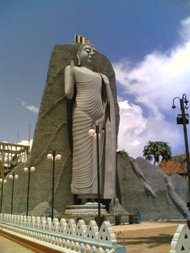UPDATE 1-Buffett world's richest man, Slim second - Forbes
|
By Emily Chasan
NEW YORK (Reuters) - Warren Buffett, the famed U.S. investor who heads Berkshire Hathaway Inc (nyse: BRKA - news - people ), replaced his friend and Microsoft Corp (nasdaq: MSFT - news - people ) founder Bill Gates as the richest man in the world, Forbes magazine said Wednesday.
The magazine estimated Buffett's worth at $62 billion in its annual ranking of the world's wealthiest people.
Mexican telecoms tycoon Carlos Slim came in second with an estimated worth of $60 billion, pushing Gates to third place after 13 years of holding the No. 1 spot.
The magazine estimated Gates' worth at $58 billion.
Buffett's rise to No. 1 was particularly noteworthy, Forbes said, as it came at a time of great financial turmoil and as Buffett has begun to siphon off part of his fortune to charity.
"Even though he is giving away a piece of his fortune each year, the stock of Berkshire Hathaway, the source of Warren Buffet's wealth, has been rising very rapidly," Chief Executive of Forbes Magazines Steve Forbes said, noting Buffett's fortune climbed $10 billion in the last calendar year.
Buffett in June 2006 announced plans to give 85 percent of his fortune away, granting it to the Bill & Melinda Gates Foundation and four family charities. Bill Gates serves on the board of directors of Berkshire Hathaway and is a long-time bridge buddy of Buffett's. Gates has also given a substantial amount of his fortune to the foundation.
Buffett, often called the Sage of Omaha, has been lauded among investors for his preference for investing in larger companies with easy-to-understand businesses, large or dominant market shares, consistent earnings, and strong management.
In the early 1960s, Buffett started to invest in Berkshire, then a struggling textile maker, and took it over in 1965. Since then, he has transformed it into a holding company for more than 50 companies, ranging from Benjamin Moore paint and Dairy Queen ice cream to Fruit of the Loom underwear and Ginsu knives.
Gates has held the No. 1 spot since 1995, when he unseated Yoshiaki Tsutsumi, a Japanese real estate tycoon. Tsutsumi fell off the billionaire's list last year after receiving a suspended prison sentence for falsifying financial statements and insider trading in 2005.
Slim, a former stock market trader, is known for buying up struggling, cheap firms and turning them into profitable cash cows. He built his fortune by privatizing former Mexican state telephone monopoly Telmex. America Movil (nyse: AMX - news - people ) , a Telmex spin-off, is is now Slim's flagship business and Latin America's biggest mobile phone company.
KEEPING UP WITH THE RUSSIANS?
The collective net worth of the world's 1,125 billionaires soared to $4.4 trillion, the magazine said.
The list of billionaires has almost doubled in the past four years, Forbes said. There were 469 U.S. billionaires, worth a combined $1.6 trillion, while the 656 billionaires who live outside the United States are worth $2.8 trillion.
Russia came in second place as home to 87 billionaires and Moscow is now the world's billionaire center, the magazine said. The Russian capital is now home to more billionaires than New York City.
India, China and Turkey also saw large gains in numbers of billionaires.
The world's youngest billionaire is 23-year-old Mark Zuckerberg, founder of social networking Web site Facebook. The magazine estimated his worth at $1.5 billion and said he is the youngest self-made billionaire to ever appear in the Forbes billionaire rankings.
Recent turmoil in the financial markets has taken its toll on the list.
James Cayne, Chairman of investment bank Bear Stearns Cos (nyse: BSCPRE - news - people ) ; William Pulte, who founded U.S. home builder Pulte Homes (nyse: PHM - news - people ) Inc; and Howard Schultz, founder of coffee chain Starbucks (nasdaq: SBUX - news - people ) all fell off the billionaire's list amid declines in their companies' stock prices.
The decline in the dollar, a trend that Buffett himself has been betting on since 2002, provided a boost to billionaires outside the United States, particularly because the Forbes list is tabulated in U.S. dollars.
The full list of billionaires is available at (http://www.forbes.com/billionaires). (Editing by Michelle Nichols and Eric Walsh)
Copyright 2008 Reuters, Click for RestrictionWarren Buffett Biography
The Story of Berkshire Hathaway's Billionaire Chairman
Warren Buffett is Born
Warren Edward Buffett was born on August 30, 1930 to his father Howard, a stockbroker-turned-Congressman. The only boy, he was the second of three children, and displayed an amazing aptitude for both money and business at a very early age. Acquaintances recount his uncanny ability to calculate columns of numbers off the top of his head - a feat Warren still amazes business colleagues with today.At only six years old, Buffett purchased 6-packs of Coca Cola from his grandfather's grocery store for twenty five cents and resold each of the bottles for a nickel, pocketing a five cent profit. While other children his age were playing hopscotch and jacks, Warren was making money. Five years later, Buffett took his step into the world of high finance. At eleven years old, he purchased three shares of Cities Service Preferred at $38 per share for both himself and his older sister, Doris. Shortly after buying the stock, it fell to just over $27 per share. A frightened but resilient Warren held his shares until they rebounded to $40. He promptly sold them - a mistake he would soon come to regret. Cities Service shot up to $200. The experience taught him one of the basic lessons of investing: patience is a virtue.
Warren Buffett's Education
In 1947, a seventeen year old Warren Buffett graduated from High School. It was never his intention to go to college; he had already made $5,000 delivering newspapers (this is equal to $42,610.81 in 2000). His father had other plans, and urged his son to attend the Wharton Business School at the University of Pennsylvania. Buffett stayed two years, complaining that he knew more than his professors. When Howard was defeated in the 1948 Congressional race, Warren returned home to Omaha and transferred to the University of Nebraska-Lincoln. Working full-time, he managed to graduate in only three years.Warren Buffett approached graduate studies with the same resistance he displayed a few years earlier. He was finally persuaded to apply to Harvard Business School, which, in the worst admission decision in history, rejected him as "too young". Slighted, Warren applied to Columbia where famed investors Ben Graham and David Dodd taught - an experience that would forever change his life.
Ben Graham - Buffett's Mentor
Ben Graham had become well known during the 1920's. At a time when the rest of the world was approaching the investment arena as a giant game of roulette, he searched for stocks that were so inexpensive they were almost completely devoid of risk. One of his best known calls was the Northern Pipe Line, an oil transportation company managed by the Rockefellers. The stock was trading at $65 a share, but after studying the balance sheet, Graham realized that the company had bond holdings worth $95 for every share. The value investor tried to convince management to sell the portfolio, but they refused. Shortly thereafter, he waged a proxy war and secured a spot on the Board of Directors. The company sold its bonds and paid a dividend in the amount of $70 per share.When he was 40 years old, Ben Graham published Security Analysis, one of the greatest works ever penned on the stock market. At the time, it was risky; investing in equities had become a joke (the Dow Jones had fallen from 381.17 to 41.22 over the course of three to four short years following the crash of 1929). It was around this time that Graham came up with the principle of "intrinsic" business value - a measure of a business's true worth that was completely and totally independent of the stock price. Using intrinsic value, investors could decide what a company was worth and make investment decisions accordingly. His subsequent book, The Intelligent Investor, which Warren celebrates as "the greatest book on investing ever written", introduced the world to Mr. Market - the best investment analogy in history.
Through his simple yet profound investment principles, Ben Graham became an idyllic figure to the twenty-one year old Warren Buffett. Reading an old edition of Who's Who, Warren discovered his mentor was the Chairman of a small, unknown insurance company named GEICO. He hopped a train to Washington D.C. one Saturday morning to find the headquarters. When he got there, the doors were locked. Not to be stopped, Buffett relentlessly pounded on the door until a janitor came to open it for him. He asked if there was anyone in the building. As luck (or fate) would have it, there was. It turns out that there was a man still working on the sixth floor. Warren was escorted up to meet him and immediately began asking him questions about the company and its business practices; a conversation that stretched on for four hours. The man was none other than Lorimer Davidson, the Financial Vice President. The experience would be something that stayed with Buffett for the rest of his life. He eventually acquired the entire GEICO company through his corporation, Berkshire Hathaway.





No comments:
Post a Comment